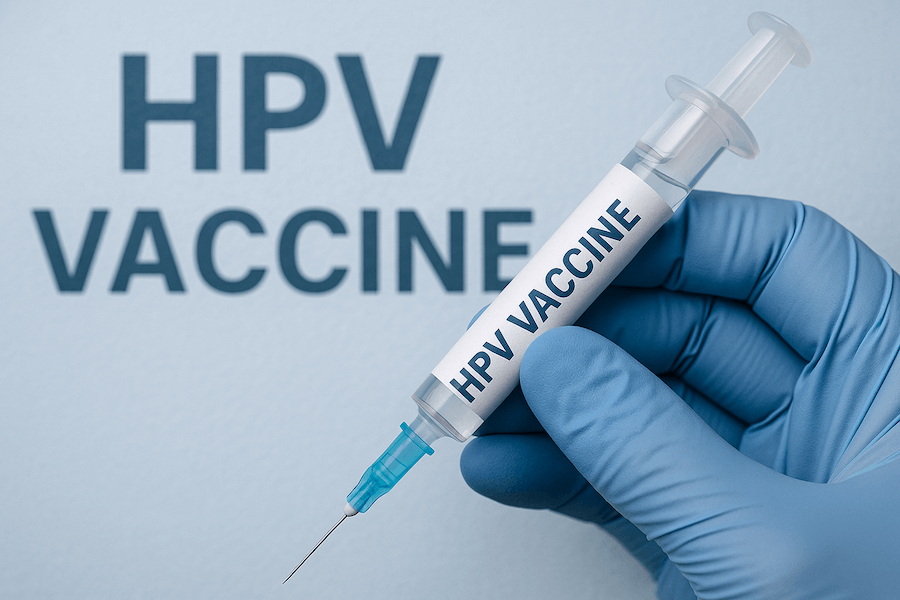Understanding HPV and Its Risks in India
Most people in India have heard about cervical cancer, but very few know that one small virus called HPV (Human Papillomavirus) is the main reason behind it. HPV spreads mostly through skin contact and sexual activity. It doesn’t always cause visible symptoms, so most people don’t even know they have it. But over time, it can lead to problems like genital warts and even cancer in the cervix, throat, or anus.
In India, lakhs of women are diagnosed with cervical cancer every year. Many of these cases could have been prevented with early awareness and vaccination. That’s why learning about HPV and how to stop it is so important.
How Vaccination Helps Prevent Cervical Cancer
The HPV vaccine works by training your body’s immune system to fight against the virus before it can cause any harm. It’s like giving your body a memory card of the virus, so next time it tries to attack, your body already knows how to defeat it.
Cervical cancer is not something that happens overnight. It takes years for HPV infection to turn into cancer. If girls (and even boys) get vaccinated at the right age, the virus never gets a chance to settle. The vaccine doesn’t treat HPV, but it prevents it. Which is why doctors recommend taking it before any exposure to the virus.
Who Should Get Vaccinated and When
In India, the HPV vaccine is mainly advised for girls aged 9 to 14 years. This is because at this age, the body responds best to vaccines and builds long-lasting protection. But it’s not only for young girls. Women up to 26 years can also take it, and even boys can benefit, as HPV affects men too.
Usually, two doses are enough if the vaccine is started before age 15. For those above that age, three doses may be needed. The exact schedule depends on the doctor and the brand of vaccine used. Parents should discuss it with their child’s pediatrician to plan it early, just like other childhood vaccines.
Available Vaccines and Their Differences
Right now, India has a few options for HPV vaccination. The most talked-about one is Cervavac, developed by the Serum Institute of India. It’s our own “Made in India” vaccine and costs much less compared to imported ones. Then there are Gardasil and Cervarix, which have been used for many years worldwide.
Cervavac covers four common HPV types (called quadrivalent), while newer versions like Gardasil 9 cover nine types. All these vaccines work effectively, the main difference lies in coverage and price. The best part is that with the launch of Cervavac, the HPV vaccine has become much more accessible for Indian families.
Cost and Where to Get It in India
Earlier, the biggest problem was cost, imported HPV vaccines were priced between ₹3,000 – ₹4,000 per dose. For three doses, that was a lot for many families. But now, with Cervavac, the price has come down to around ₹4,000 for a full course in many government setups.
You can get it at most private hospitals, gynecology clinics, and vaccination centers. In some states, government hospitals have started giving it free to adolescent girls. The aim is to include it in the national immunization program soon, so every girl in India can get it easily without cost being a barrier.
Common Myths and Real Facts About HPV Vaccination
Even today, some people hesitate because of wrong beliefs. A few think that HPV vaccine affects fertility, that’s not true. It doesn’t impact the ability to have children later. Some fear it causes serious side effects, but apart from mild fever or soreness in the arm, it’s completely safe.
Globally, millions of people have taken this vaccine for over a decade. If it wasn’t safe, it wouldn’t be approved by health bodies like WHO. The real danger is skipping the vaccine and facing cervical cancer risk later in life. We should trust doctors and not WhatsApp rumors when it comes to health.
I Am 20+ Now, What Should I Do?
If you are a 20+ woman and still wondering whether the HPV vaccine will help the answer is yes, it will. Even though the best time to take it is during the teenage years, women up to 26 years can still benefit from it. Vaccines like Gardasil 9 protect against nine major types of HPV viruses, which are responsible for most cervical cancer and genital wart cases. So, it’s never too late. If you are not vaccinated yet, talk to your gynecologist. A quick blood check and doctor’s advice are all you need. Protecting yourself now can safeguard your future health.
Why Awareness Still Matters
Awareness is the main battle. Many parents in India don’t know that a simple vaccine can protect their daughters from cervical cancer. Schools and doctors play a huge role here. If health talks and camps are held regularly, families will understand the importance better.
India has seen success with vaccines before polio, hepatitis, COVID and the HPV vaccine can be the next big step. But it needs open conversation. We should talk about it like we talk about routine vaccines, not as a taboo or “adult topic.” Awareness today means saving lives tomorrow.
A Healthier India Starts with Prevention
As Indians, we often wait for illness before we act. But prevention is always easier and cheaper than treatment. The HPV vaccine is proof that modern medicine can stop cancer before it starts. Every parent should ask their doctor about it, every school should talk about it, and every girl and boy should grow up knowing this protection exists.
Cervical cancer takes away thousands of women each year mothers, sisters, wives but we now have the power to stop it. Let’s make sure we use it. A small injection today can protect a whole life tomorrow.
